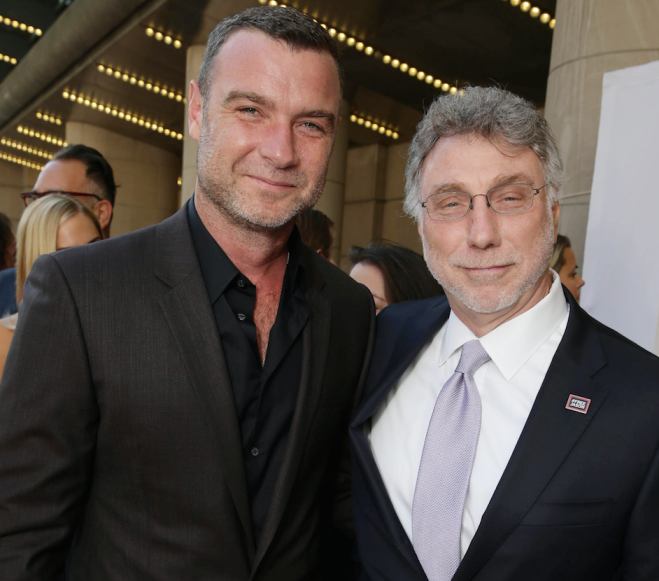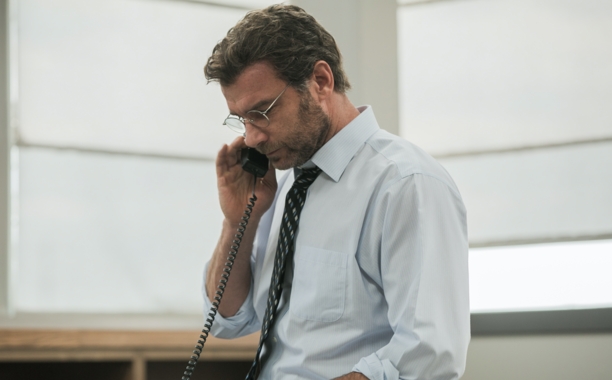|
Spotlight’s secret weapon: Liev Schreiber discusses his role as the Boston Globe’s inscrutable editor-in-chief
By Joe Mcgovern
Entertainment Weekly
November 21, 2015
http://www.ew.com/article/2015/11/21/spotlight-liev-schreiber-marty-baron-boston-globe
 |
| Liev Schreiber and Marty Baron |
For all the severity of its subject matter, Tom McCarthy’s extraordinary journalism drama Spotlight (in theaters now) is not a movie of noble gestures and emotive Oscar-bait moments. And the performance which best encapsulates the film’s unassuming, non-vainglorious, worker-bee approach to its story is Liev Schreiber as Boston Globe editor-in-chief Marty Baron, who pressed his paper to fully investigate the colossal cover-up in Boston of sexual abuse within the Catholic Church.
Spotlight has been compared favorably — and justifiably — to the gold standard in journalism movies, 1976’s seminal All the President’s Men. According to that point of analogy, Schreiber’s top boss role is similar to Jason Robards’ Oscar-winning part as the saucy, colorful Washington Post editor Ben Bradlee. But Baron, who left the Boston Globe in 2012 and incidentally now runs the Washington Post, is a quieter and more reticent personality, especially for a newsman. Having arrived from his previous job at the Miami Herald as the film begins, Baron is viewed with suspicion by most of his staff — and the good ol’ boy Irish Catholic culture.
Schreiber’s acting in the film is a masterpiece of tranquility. The penetrating screen presence which the actor has brought to dozens of roles during his 20 year film and TV career — including The Daytrippers, The Sum of All Fears, X-Men Origins: Wolverine, and Ray Donovan, not to mention his Tony-winning work on stage — has been tightly coiled in Spotlight into a stealth tiger of a man, whose calmness betrays his deep ethical conviction. Baron, ultimately, is the truest hero of the movie. And Schreiber, for the miraculously ego-less way in which he communicates that, gives what just might just be the most nuanced, subtly commanding performance of his life.
Baron does not have a lot of screen time in Spotlight. But Schreiber, 48, still felt an enormous sense of responsibility when he accepted the part. “I was immensely proud to be playing Marty Baron,” he says. “There have been a couple roles in my lifetime that I thought, ‘This is really special.’ Marty is way up on that list, right up there with Hamlet and Iago. He’s a real hero. And what’s exciting for me personally is that a lot of people are finding out about him now who never knew who he was.”
“Hamlet and Iago? Wow,” says Baron via email. “Liev must have keen powers of observation. All my friends and colleagues say he nailed me. And we spoke in person for only two hours — or less. He certainly had an impossible challenge in portraying me: How do you play someone who does not emote? But he did it brilliantly, giving the character an intensity that might unnerve even me.”
Schrieber spoke to EW from the set of his forthcoming biopic about professional boxer Chuck Wepner, and talked about his approach to playing a man of great stature in the quietest of tones.
ENTERTAINMENT WEEKLY: How much were you aware of the Boston Globe’s reporting on the church abuse story in 2002?
LIEV SCHREIBER: I remember the story when it broke, but not really until it had made national news, which was even some time after the Globe article came out. So, no. I guess I have had, since starting Ray Donovan, I did a bunch of research into SNAP [Survivors Network of those Abused by Priests] and learned about the general timeline with the John Geoghan case and Cardinal Law, but that was long after the case broke.
How did you find out about the film?
Tom sent me the script while I was in Georgia watching the kids, while Naomi [Watts, Schreiber’s spouse] was working on a project.
With the idea of you playing Marty?
No, he didn’t say anything about that. He just sent me the script out of the blue. To be honest, at the time I felt kind of frustrated to read a script for him, though he is a very good friend. We went to graduate school [the Yale School of Drama] together. I let it sit for two or three days, but as soon I sat down to read it, I was really very impressed. He and [co-screenwriter] Josh Singer did a remarkable job of telling the story in an intelligent way. And you don’t expect that in the movie business these days [laughs].
I’m sure it was a total page-turner as a script.
Oh yeah, I thought it read really well as a book, actually. It had a literary quality and an attention to detail that was very rare. But I was worried about it as a film.
Why?
Because, you kind of hope that people still have appetites for that kind of story — as you also hope that people still have appetites for long-lead investigative journalism — but we all know that it’s a very tough market for that.
When you and Tom eventually talked about you playing Marty Baron, were you concerned that he was such non-colorful character?
Well, knowing what I knew, I was more shocked that Marty was such a relatively small character. By the time I read the script, I knew the story very well. And so I was surprised that he spent so much time on the sidelines in the script. Especially since, you know, in the story he’s such a powerful element.
Yeah, the film is a true ensemble, but Marty’s presence is strongly felt even in scenes you’re not in. And I love that late scene when you’re editing the story before it goes to press and you’re just taking out adjectives.
[laughs] Yeah, I like that moment.
I feel like that’s a great metaphor for your performance. It’s so unshowy.
A lot of credit for that goes to Tom and Josh, for creating an environment — and staying true to it — where there’s no need for big theatrics or banner movie moments. And that allows the story to lead, and then you realize how remarkable these people are. I think if an actor leads in a story like this, you think, “What a great performance.” But you really come away from this movie just thinking about this incredibly important journalistic resource is in our culture. And how catastrophic the loss of it could be.
Had you met with Marty before filming began?
Yeah. He invited me to come visit him in Washington and I went down to the Post. Initially I had heard so many things about him. That he was very a reserved guy, a real tough boss, totally inscrutable. But I found him to be incredibly generous.
But did you see why people have characterized him that way?
I guess so. His mind is so sophisticated and balanced and maybe that gives people a certain take-away. But looking at me, sitting in his office, he was probably thinking, “What the hell is this guy who plays on Ray Donovan, whatever the hell that is, going to do with me?” And that would make anyone run for the hills. But something about him that I noticed right away is that Marty can always see the bigger picture.
And that’s very key to his part in the movie.
Yeah. Probably his deductive reasoning at the moment he met me said, “This is an important story and it’s well-rendered on the page, so I have to be as generous as I can be with this actor so he can help the guys make the film.” I could see that he had made that decision in his mind. And that was a great insight into him.
What did you ask about?
I wanted to know something about his personal life. I wanted to know what he liked to do and who his friends were and what his aspirations were when he was younger. I wanted to know where he hung out and who he hung out with. Things that I didn’t need to know but things that I was curious about.
And those things matter. There is a scene in the film when people ask each other if Marty is married or not. His Jewish identity is so interestingly woven into the plot.
I think from the beginning, Marty’s presence alone was a challenge to the cultural status quo in Boston. I mean, the paper had been sold to The New York Times and now they were sending a Jew from Miami to run the place. He doesn’t think that all that stuff factors into his job performance — and I think he’s absolutely right. The only way it ever factors into his job is when other people are trying to find ways to discredit or alienate him. Whatever those questions that they had, about his spirituality or his sexuality or whatever, were the questions of desperate gossips trying to defend themselves from the truth.
Right. They thought he might be easy to take down.
But I don’t think ever spent time worrying about that. This is a guy who has spent so much of his time being on the right side of things. He’s so unafraid of the truth and so really he doesn’t give attacks on him like that any credit or value. He wasn’t afraid of them either, not the slightest bit.
I also really enjoyed your performance as chess champion Boris Spassky in Pawn Sacrifice, from earlier this year. Another quiet one.
Oh, thank you.
That is a performance delivered entirely in Russian, in subtitles. What that your idea?
No! [laughs] Are you kidding? Why would anyone do that to themselves? No, it was [director] Ed Zwick’s idea. He wanted establish the dark, paranoid, Iron Curtain kind of vibe. He wanted to make Spassky as intimidating as possible, while also being as inscrutable and sort of “Movie Star Russian” as possible. And speaking Russian the entire time was something that Ed thought we could use.
I kept waiting for you to switch to English.
I think people should speak their own languages in movies. I mean, you have a character who is the personification of Russia — it’s so rare that he would actually be speaking English.
And how’s it going with your own Raging Bull — your movie about Chuck Wepner? Presumably not another quiet man role?
[laughs] No. It’s called The Bleeder, yeah. We’re still filming. We’re hot and heavy; we’re in the thick of it. Today is one of my days off, so I haven’t had to be in the make-up chair or in the ring. I’m just laying out the couch recovering. It’s been really intense. Philippe Falardeau is directing. He was nominated for an Oscar a few years ago for Monsieur Lazhar and he’s really wonderful. So as much as I try to screw it up everyday, he’s really doing some amazing things. If all goes well, we’ll be getting that out next year.
|

